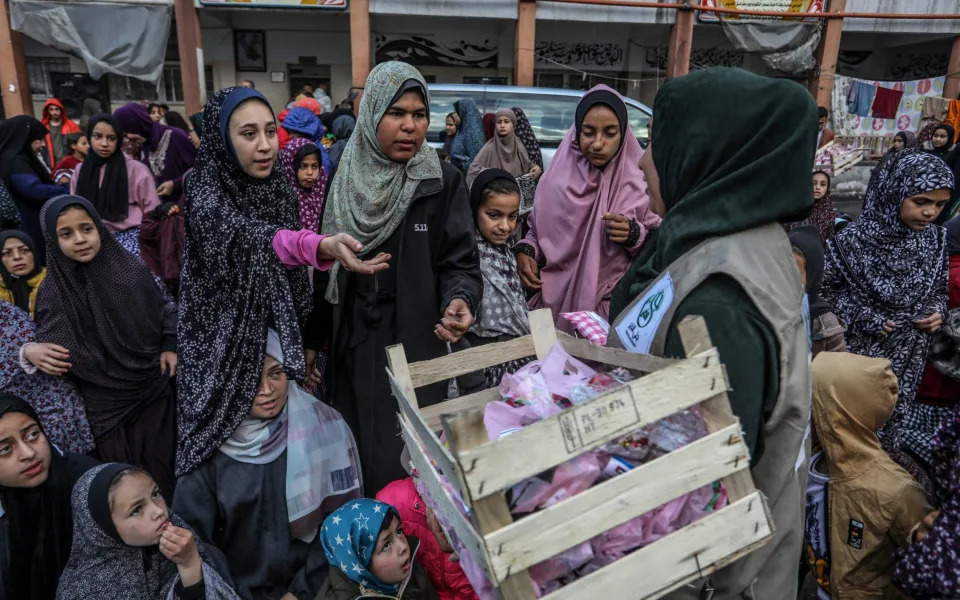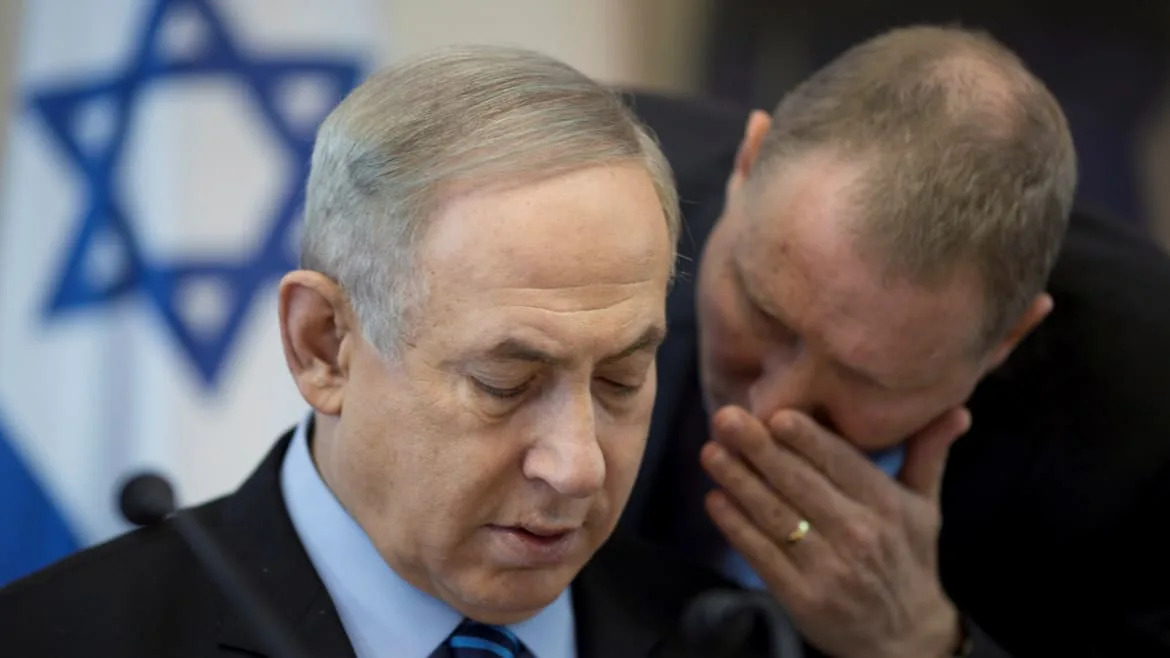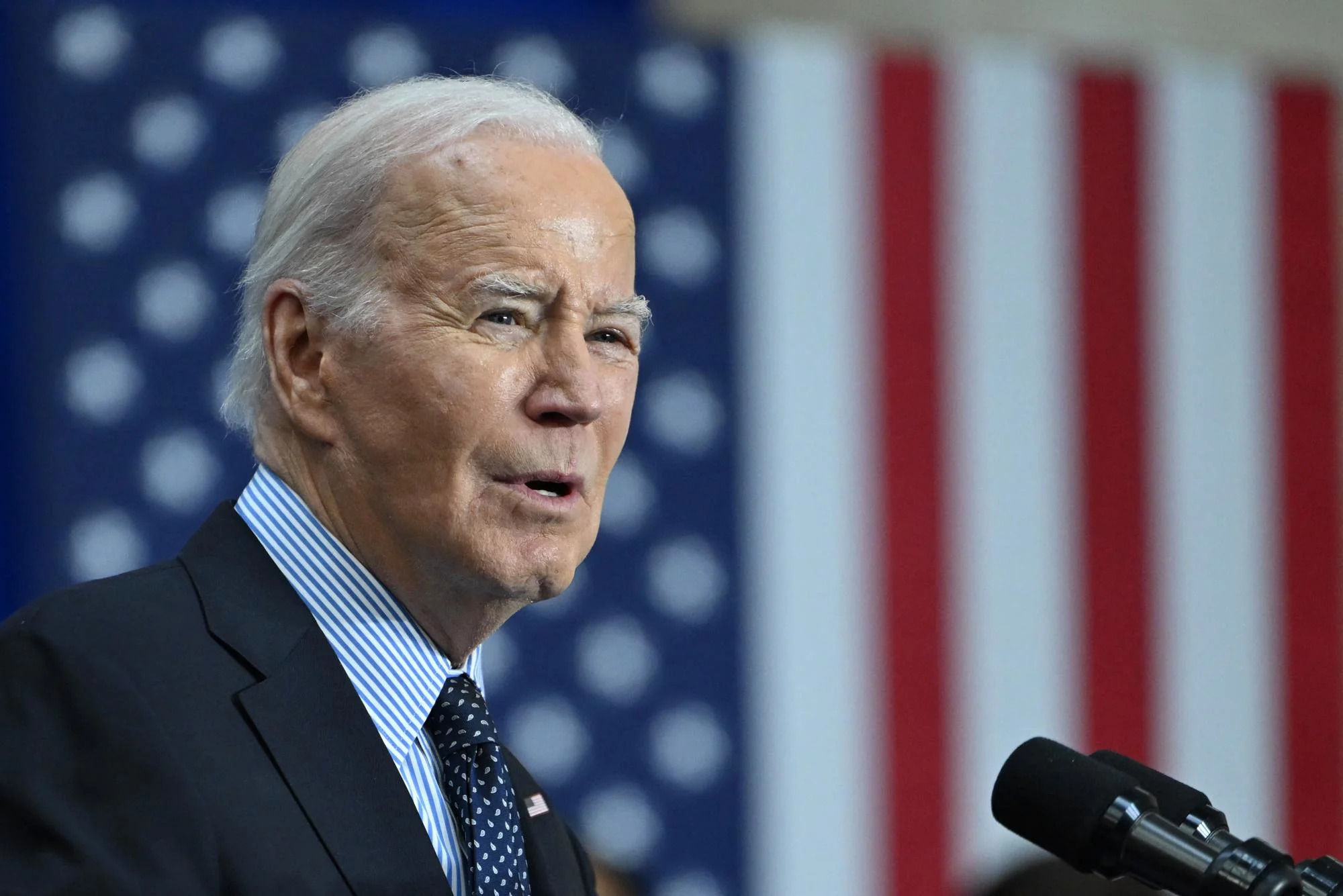U.S. Intel Warns of Imminent Iranian Strike on Israel: Report

The Biden administration believes that an Iranian attack on Israel is imminent, according to a Bloomberg report released Wednesday.
The dramatic escalation would come days after a strike on an Iranian mission in Damascus killed a top Iranian commander and other IRGC officials. Iran has blamed Israel for the attack and vowed to retaliate.
The Israeli military has been on “heightened” alert for possible attacks from Iran in the aftermath of the assassination, although it has not publicly claimed responsibility for the deadly Damascus strike. The Israeli Defense Forces have been preparing for a possible strike from Tehran by boosting air defenses, jamming GPS, and canceling leave for soldiers in combat units.
The attack could come in the form of missile or drone strikes against Israeli government sites, Bloomberg reported. The attack could come from Iran or from its proxies in the region, according to Bloomberg.
As the situation threatened to spiral, Germany’s Lufthansa airline announced Wednesday that it is canceling flights to and from Tehran “due to the current situation in the Middle East.”
“We are constantly monitoring the situation in the Middle East and are in close contact with the authorities. The safety of our guests and crew members is Lufthansa’s top priority,” a spokesperson said, according to Reuters.
The White House National Security Council declined to comment.
Iran’s Revenge Threat Sparks Panicked Preparations in Israel
President Joe Biden said Wednesday that Iran is threatening a “significant attack on Israel.” He added in his remarks that the United States’ commitment to Israel is “iron-clad.”
“As I told Prime Minister Netanyahu, our commitment to Israel's security against these threats from Iran and its proxies is ironclad. Let me say it again, ironclad. We're gonna do all we can to protect Israel's security,” the president said.
Iranian officials have signaled for months a hesitation to trigger an all-out war with Israel despite frequent attacks in recent months by Iranian-backed proxies, such as Hezbollah and the Houthis in Yemen.
Earlier on Wednesday, Iranian Supreme Leader Ayatollah Ali Khamenei reiterated that he believes Israel should be punished for the attack in Damascus.
“When the Zionist regime attacks an Iranian consulate in Syria, it is as if it has attacked Iranian soil. That malicious regime has made a wrong move. It should be punished, and it will be punished,” Khamenei said on Twitter.
Israeli Minister of Foreign Affairs Israel Katz later tweeted at Khamenei with a warning that if Iran attacks Israel, Israel will respond in kind.
“If Iran attacks from its territory, Israel will react and attack in Iran,” Katz said.
Biden vows ‘ironclad’ US commitment to Israel amid fears of Iran attack
Joe Biden has vowed that US commitment to defend Israel against Iran was “ironclad” as concerns rose in Washington that a “significant” Iranian strike could happen within days, in retaliation for the bombing of an Iranian consular building in Damascus.
US and allied officials fear that a strike is imminent and could come in the form of a direct missile launch from Iran, rather than an attack through a proxy like Hezbollah in Lebanon. Israel has vowed to respond in kind to such a direct strike, raising the prospect of a regional war, which US officials now believe is more likely than at any point since the beginning of the Gaza conflict on 7 October.
Biden’s pledge of support to Israel at the White House, intended as a deterrent, came a few hours after Iran’s supreme leader, Ayatollah Ali Khamenei, repeated a threat to strike back against Israel over the Damascus bombing that killed 12 people, including Gen Mohammad Reza Zahedi, a senior figure in Iran’s Islamic Revolutionary Guard Corps, and six other guard members.
“When they attacked our consulate area, it was like they attacked our territory,” Khamenei said, in remarks broadcast by Iranian state TV. “The evil regime must be punished, and it will be punished.”
Israel’s foreign minister, Israel Katz, responded in a post on the X social media platform, vowing that: “If Iran attacks from its territory, Israel will respond and attack in Iran.”
Israel has not formally taken responsibility for the 1 April bombing, but Israeli and US officials have made clear it carried out the strike.
Israel and Iran have been trading blows in Lebanon and Syria for months, but Biden administration officials fear that the 1 April Damascus bombing on an Iranian diplomatic building, which Tehran considers its own territory, has significantly raised the threat of the Gaza war widening into a broader conflict.
Since the Damascus bombing, Tehran has sent Washington messages attributing ultimate blame for the attack on the US and warning the US to stay out of its confrontation with Israel.
Biden’s pledge to Israel on the White House lawn, in a joint appearance with the Japanese prime minister, Fumio Kishida, appeared to be a response to that warning, insisting the US would not stay on the sidelines.
“We also want to address the Iranian threat to launch a significant – they’re threatening to launch a significant attack in Israel,” Biden said. “As I told Prime Minister Netanyahu, our commitment to Israel’s security against these threats from Iran and its proxies is ironclad. Let me say it again, ironclad. We’re gonna do all we can to protect Israel’s security.”
The Biden administration is seeking to head off a direct Iranian attack by messaging that Tehran cannot assume that US forces in the region, reinforced significantly since the start of the Gaza war, would stay out of a conflict with Israel.
“We’ve been clear that we do not want this conflict to escalate or spread further in the region. We’ll continue to undertake diplomatic efforts to ensure that remains the case,” the spokesperson said. “We also retain a military presence in the region to deter those who seek to take advantage of the conflict.”
Secretary of state Antony Blinken reiterated that message on Wednesday in a call with Israeli defence minister Yoav Gallant, in which he made clear the US would stand with Israel against any threats by Iran, the state department said.
Alon Pinkas, a former Israeli diplomat and adviser to prime ministers Ehud Barak and Shimon Peres, said: “The prevailing conventional wisdom is that because the attack in Damascus was directly against Iran, then that means that Iran will have to respond to retaliate directly, rather than via a proxy.
“From what I’m hearing here, the most telling sign is that Khamenei has mentioned the need to retaliate twice in the last week in his sermons or whatever,” Pinkas said. “Usually, they don’t do that. Usually they are much more opaque and only commit to a response one day at the right moment and in the right place.”
Among the possible targets are Israeli embassies around the world, and they have been taking extra security precautions in the wake of the Damascus bombing, but US officials also believe that a direct strike on military or government targets on Israeli territory is also a significant possibility.
The US and Israeli militaries and intelligence agencies are in constant contact about the threat. Axios reported that the head of US Central Command, Gen Erik Kurilla, is due in Israel on Thursday to discuss coordination with his Israeli counterparts and the defence minister, Yoav Gallant.
The ability of the Biden administration to rein in an Israeli response to an Iranian attack would very much depend on the specifics. If Iranian retaliation comes in the form of an assault on an Israeli embassy, or if an incoming Iranian missile or drone is intercepted, it may be possible to prevent escalation, officials said, but if an Iranian strike caused multiple casualties inside Israel, it would be very much harder.
Biden issues warning as Iran ‘prepares to launch missile strike’ on Israel
Joe Biden has warned Iran not to launch an attack on Israel, amid reports of an “imminent” missile strike targeting the country.
The US president said his commitment to Israel’s security was “ironclad” and that Washington would do “all we can” to protect it from an attack by Tehran in retaliation for a strike in Syria that killed senior Iranian generals.
On Wednesday evening, Bloomberg reported that US intelligence officials believed an attack on Israeli soil was imminent and could involve “high-precision missiles”.
Speaking at a press conference in Washington, Mr Biden said: “We also want to address the Iranian threat … they’re threatening to launch a significant attack in Israel.
“As I told Prime Minister [Benjamin] Netanyahu, our commitment to Israel’s security against these threats from Iran and its proxies is ironclad. Let me say it again, ironclad … all we can to protect Israel’s security.”
A Pentagon official on Wednesday night declined to comment on reports that the US was preparing to intercept Iranian missiles, and to join retaliatory strikes by Israel.
The official told The Telegraph the US government was “aware of Iran’s rhetoric” and that “both Israel and the US take it seriously”.
Foreign embassies have reportedly already begun evacuations in anticipation of an attack in the coming days, after Iran’s supreme leader said Israel “must be punished” for an air strike on an Iranian embassy compound in Syria.
Israel has not claimed responsibility for the strike, which killed two generals and five military advisers on April 1. The most high-profile victim was Mohamed Reza Zahedi, who led the elite Quds Force of the Islamic Revolutionary Guard in Lebanon and Syria until 2016.
In a speech to mark the end of Ramadan on Wednesday, Ayatollah Khamenei vowed to take revenge on Israel.
“When they attack the consulate, it is as if they have attacked our soil,” he said. “The evil regime made a mistake and must be punished and it shall be.”
Two days after the attack, he said “the Zionist regime” would “receive a slap in the face” in retaliation.
Military targets
US officials reportedly believe any Iranian strike would likely be on military and government buildings, not civilian targets. One source told Bloomberg that an attack was considered a matter of when, not if.
Any strike could escalate the conflict in the Middle East to a direct war between two of the region’s biggest powers.
Yoav Gallant, the Israeli defence minister, has said Israel would respond to an attack with its own strike on Iranian soil.
Speaking to troops in northern Israel, Mr Gallant said Iran would face a “powerful response in its territory”.
“In this war, we are being attacked from more than one front … from different directions,” he said.
“Any enemy that tries to attack us will first of all be met with a strong defence. But we will know how to react very quickly with a decisive offensive action against the territory of whoever attacks our territory, no matter where it is, in the entire Middle East.”
Iran has been accused of supporting Hamas in its war against Israel and of stoking the conflict through its proxy groups in Iraq, Syria, Lebanon and Yemen.
The attack on Israel could come from Lebanon, where Hezbollah is located, although intelligence officials reportedly believe it could also be launched from elsewhere in the region.
Tehran has long avoided attacking Israel directly but Khamenei said that “our fighters” would be involved in Iran’s revenge.
Israeli officials have said they will wait for the Iranian attack before launching a planned assault on Rafah, in the south of Gaza, where the Israeli government has vowed to root out remaining Hamas fighters.

Iran has also blamed Britain and the US for its role in the air strike on April 1, and argues that Israel’s Western backers are complicit in the deaths of its troops.
While the US has publicly warned Israel against attacking Rafah because of expected civilian casualties, Washington has remained supportive of the war against Hamas and committed to Israeli security.
Earlier on Wednesday, Lord Cameron, the Foreign Secretary, said the UK was “absolutely clear about the threat that Iran poses to the region” and pointed to British participation in strikes against the Yemeni Houthis, another Iranian proxy group.
“Britain stands with our allies, crucially, including the United States, we stand up for Israel’s right to self-defence,” he told Fox News.
The UK Government has retained diplomatic ties with Iran throughout the conflict, despite Lord Cameron’s declaration that the country is “a thoroughly malign influence in the region and in the world”.
On Wednesday evening, Lufthansa, the German flight operator, announced it was suspending flights to Tehran “due to the current situation in the Middle East”.
A spokesman said the company was “constantly monitoring the situation in the Middle East and are in close contact with the authorities”.
Separately on Wednesday, three sons of the Hamas leader Ismail Haniyeh were killed by an Israeli strike in central Gaza.
The IDF said they were operatives of Hamas’s military wing. Haniyeh said several of his grandchildren had also been killed.
- Questions and Answers
- Opinion
- Story/Motivational/Inspiring
- Technology
- Art
- Causes
- Crafts
- Dance
- Drinks
- Film/Movie
- Fitness
- Food
- Games
- Gardening
- Health
- Home
- Literature
- Music
- Networking
- Other
- Party
- Religion
- Shopping
- Sports
- Theater
- Wellness
- News
- Culture
- War machines and policy



